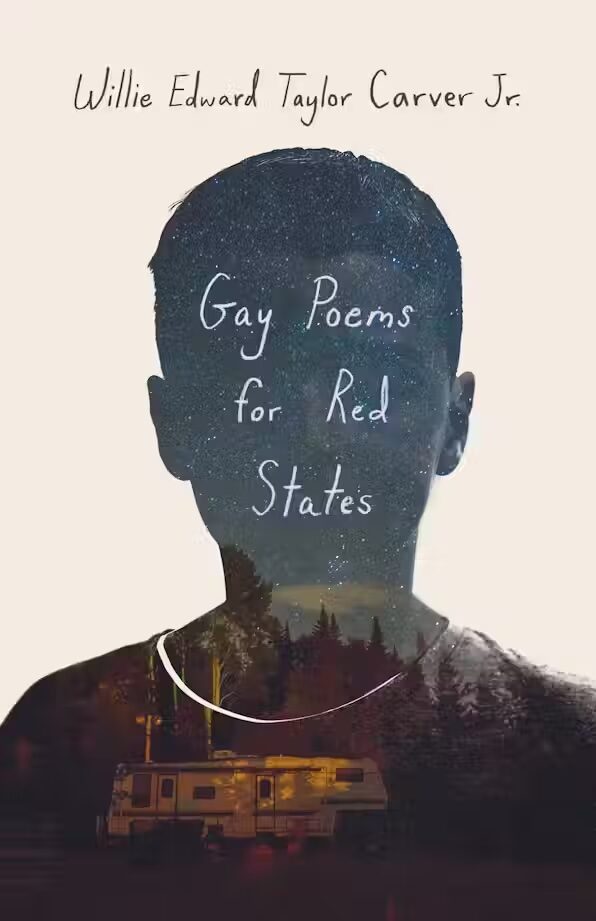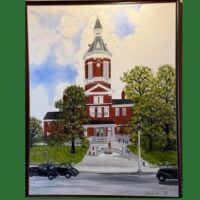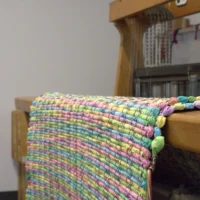No matter how hard the viewer strains to see the shadowy face obscured by the words, “Gay Poems for Red States,” the silhouette on the front cover of this stunning collection is unknowable until you open and book and read the poems.

Starting with his own backstory, Willie Edward Taylor Carver Jr. chronicles his fall from grace as a public high school teacher in Mount Sterling, Kentucky. Shortly before his first day, he is pulled aside by a Montgomery County administrator who asks if the new teacher is “openly gay.”
When Carver says yes, the administrator replies, “I just want you to understand. In this community, you will be crucified. No one will protect you, including me.”
Carver interprets the warning as a kindness, “an attempt to protect me, as if every Southern queer person isn’t already perpetually awaiting crucifixion.”
Despite the implied threat, Carver taught successfully for more than a decade, inspired by the awesome potential of the students in his classroom. In fact, he credits his students’ energy and commitment to excellence for his designation as Kentucky Teacher of the Year in 2022.
Ironically, this distinction ended Carver’s high school teaching career when a small contingent in the community began attending board meetings and accusing him of grooming, inappropriateness, and sexuality, in regard to his students. The group even resorted to doxing the teacher and some of his former students, publishing private information with apparent malicious intent.
As a result, Carver concluded, “There was no longer a place for me as a teacher.”
His poems rose from the ashes.
The first one is set in familiar territory, a McDonald’s drive-thru window. When asked, “Would you like a Hot Wheel or a Barbie?” Carver chose the Minnie Mouse toy, and the clerk gave the boy a onceover.
“You know you’re gonna ruin him?” she said to his mother, handing over the boxed meal.
Another recovered memory is Carver’s poem, “First Crush,” and a boy named Brandon with “toasted-colored hair” and shoes white as “…the blank page of a coloring book.”
One after another, Carver replays his childhood, one scene at a time. In “Clean Room,” he recalls the tumult of his brother’s lair as that of “a middle-aged trucker,” while his own was “slender and agile,/ a dancer quick to pose for cameras.”
His genius for biscuit-making was discovered early: “Before I even learned to sing the alphabet,” he declares.
The secret ingredient?
“Butter transforms everything into love between your teeth and your tongue,” Carver says, adding that the “sea of butter” changes homemade batter into “carbohydrate continents…”
As the poems toward adolescent recollections, he recognizes himself as “a jigsaw piece from an entirely different puzzle box.”
Watching an episode with his father, of “Jerry Springer” featuring a gay man from California seeking his father’s acceptance, was a milestone. Carver was amazed by his parent’s reaction:
“You know, if I ever had a kid who felt comfortable telling me something like that, I hope they’d know that it would be okay with me.”
With that remark, time slowed down. “The clock stabbed forward,” the poet says, pausing before he could come up with an apt reply:
“Well if you ever have a kid like that, I hope they do,” he finally says.
This year, April 7 – 13 is National Library Week, with April 8 the “Right to Read Day.”
In 2023, ALA documented efforts to censor 4,240 unique book titles in schools and public libraries, an increase from 2,571 the year before.
According to the website, “Organized pressure groups have used their power – and long lists of titles – to wage an aggressive campaign to empty library shelves of all books they deem inappropriate instead of allowing people to decide for themselves what they and their children read. … Nearly half of the titles impacted were by or about LGBTQIA+ individuals and people of color.”
The catch phrase for this year is, ‘Don’t let censorship eclipse your freedom to read.”
Published by University Press of Kentucky, “Gay Poems for Red States” is more than a collection of poetry. Another esteemed Kentucky writer, Chris Offutt, sees the work like this:
“Willie Carver is a humane and necessary voice from the hills of Kentucky. He writes with stunning insight, vivid imagery, and enormous courage. This is a powerful book that should be read by everyone.”
At 6 p.m. April 18, Willie Carver will speak in the Freed Curd Auditorium in the Collins Center for Industry and Technology on the MSU campus. The event is sponsored by Murray State University’s Pride Center, with support from the Department of English and Philosophy.
Between 1989 and 2023, Constance Alexander’s newspaper column Main Street was recognized for excellence five times by the Kentucky Press Association. She is an award-winning columnist, poet and playwright, and she received the Governor’s Award in the Arts for Media in 2014. A Murray resident, she now writes Left on Main, an occasional column. She is a Hoptown Chronicle board member.






